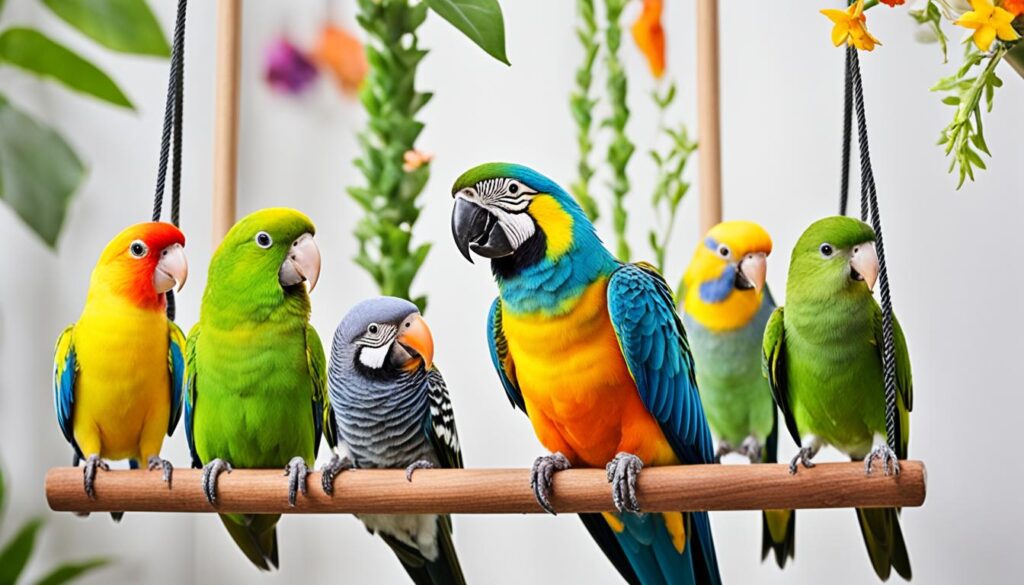In the United States, birds have risen to become the fourth most popular pet, trailing only behind dogs, cats, and fish. During the pandemic, their popularity has surged even further, as many families sought out the companionship and joy these vibrant creatures can bring to the home. From the diminutive parrotlet weighing just an ounce to the majestic hyacinth macaw reaching over 3 pounds, the world of pet birds offers a diverse array of species to choose from.
Key Takeaways
- Birds are the fourth most popular pet in the U.S., and their popularity has increased during the pandemic.
- The pet bird market offers a wide variety of species, from tiny parrotlets to giant hyacinth macaws.
- Proper care, including a suitable cage, balanced diet, and regular veterinary check-ups, is essential for the health and well-being of pet birds.
- Socializing with pet birds daily helps build trust and prevent loneliness, contributing to their overall happiness.
- Environmental enrichment, such as natural perches and foraging toys, creates a stimulating environment for pet birds.
Parakeets: The Friendly and Vibrant Companion
Parakeets, also known as budgies or budgerigars, are perhaps the most popular type of parakeet pets the world over. These delightful little birds are exceptionally affectionate and friendly companion budgie pets when properly trained and cared for. Parakeets are among the most low-maintenance types of birds kept as pets, being among the smallest companion birds as well as relatively easy to train in their youth.
Male parakeets, in particular, are known to be great birds for first-time owners, as they bond easily to their humans and are simple to train. Noted for their beautiful and varied feathers, parakeets are very active and playful birds eager to please; they are talking parakeets who can be taught to mimic spoken phrases as a delightful party trick. When left to their own devices, parakeets are singing birds, filling your home with the sounds of happy chirping.
Key Traits:
- Parakeets typically weigh around 1 ounce and measure between 6 to 8 inches in length.
- With proper care, parakeets can live up to 7-15 years.
- Parakeets are among the smallest of bird species typically kept as parakeet pets.
- Parakeets are known to be exceptionally warm, friendly, and gentle when properly cared for and trained.
Parakeets can be kept as single pets or in pairs, providing companionship and enrichment for their owners. Their vibrant personalities and low-maintenance care requirements make them an excellent choice for both first-time and experienced bird enthusiasts alike.
“Parakeets are among the most popular and friendly companion birds when properly cared for.”
Cockatiels: The Gentle and Expressive Feathered Friends
Cockatiels are among the most communicative and emotional birds, capturing the hearts of many pet owners. Famed for the distinctive crest on the top of their head, these feathered companions use it to express their feelings and connect with their flock – which in this case, includes their human caretakers.
The crest on a cockatiel’s head is a remarkable indicator of their emotional state. A flattened crest signals fear or anger, while a fully upright crest shows excitement or surprise. Cockatiels are known to be affectionate animals that bond closely with their owners, forming strong relationships with their human caregivers.
While some cockatiels can be trained to mimic words, they are renowned for their ability to imitate a variety of sounds around them, from phones and alarms to the calls of outdoor birds. Female cockatiels are often considered the gentlest of avian pets, while male cockatiels tend to have a bit more spunk and are more inclined to perform and mimic sounds for their owners.
Cockatiels are highly social creatures that crave interaction and attention. They require an owner who can provide them with the time and care they need to thrive, preventing loneliness or depression. With proper care and a nurturing environment, cockatiels can live for 20 to 25 years, making them a long-term companion for many pet enthusiasts.
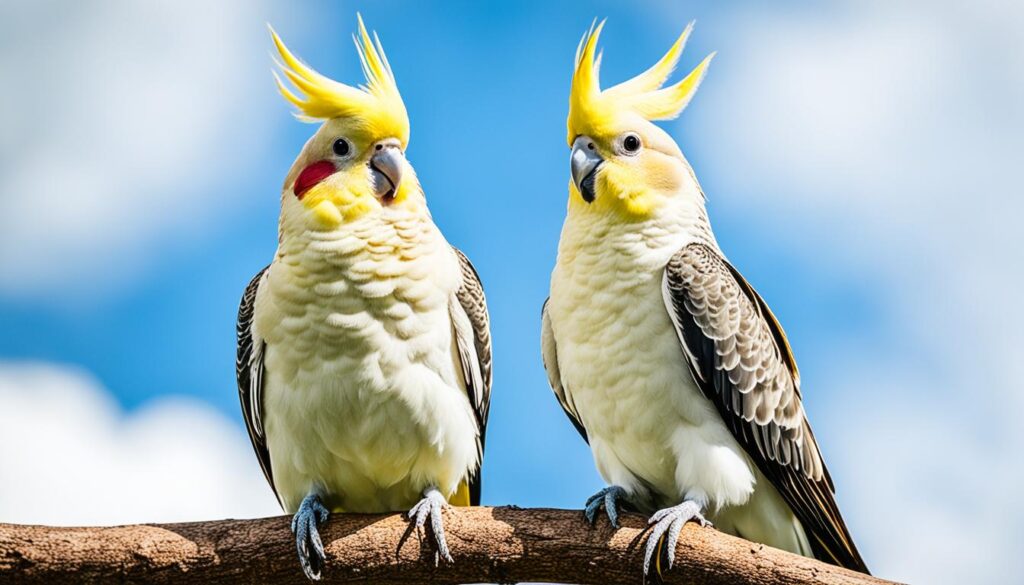
According to the Shubolt Parrot Wellness Program at the University of California, Davis, there are six important areas of parrot wellness that should be addressed, including preventive veterinary care, feeding, enrichment, behavioral training, pain management, and pediatric and geriatric care. By addressing these crucial aspects of cockatiel care, pet owners can ensure their feathered friends live long, healthy, and enriched lives.
“Cockatiels scream when you leave the room because they want attention,” says Diane Burroughs, a specialist in anxiety disorders and certified in Nutrition For Mental Health with over 30 years of experience creating successful behavior plans.
In conclusion, cockatiels are gentle and expressive companions that make wonderful additions to many households. With their unique personalities, communication cues, and mimicry abilities, these feathered friends are sure to delight and captivate their owners for years to come.
Doves: The Soothing and Low-Maintenance Pets
While doves may not be as popular as some other pet bird species, they make wonderful companions for those seeking a gentle and low-maintenance feathered friend. These birds are renowned for their soothing coos and easygoing personalities, making them an ideal choice for owners with busier schedules or who cannot be home all the time.
Key Traits
Doves are typically not overly demanding of their owners’ time or attention. This makes them a great option for those who cannot commit to the more intensive care required by some parrot species. These birds are incredibly gentle and sweet when handled or hand-fed, though they do require regular interaction and socialization to thrive.
Doves are social creatures and should not be kept alone. If kept solo, they should be given plenty of time to fly about and engage with their human caretakers. These birds are also suitable pets for older children who can understand the importance of gentle handling.
Unlike parrots, doves are not able to climb up and down cage bars. Instead, they need to fly from perch to perch, which means they require a generously sized habitat to feel at home. A minimum recommended cage size for a pair of doves is 24″ L x 36″ W x 24″ H.
“Doves are quiet and unobtrusive pets with a calming, gentle voice and prefer to be kept in mated pairs or singly.”
With their soothing coos and low-maintenance care requirements, doves make wonderful low-maintenance pet birds and gentle pet birds for those seeking a dove pets that can easily fit into their lifestyle.
Canaries: The Melodious Songsters
For centuries, the canary has been a beloved companion among birdkeepers. These feathered friends come in a diverse array, with over 200 unique breeds, each boasting its own distinctive appearance and personality. While canaries may be shyer than other birds, a little extra effort can help you bond with these melodious songsters.
One of the key traits that sets canaries apart is their exceptional singing voice. However, not all canaries are created equal in this regard – only the males are blessed with the ability to serenade their surroundings. So, if you’re seeking a feathered bard to grace your home with its sweet melodies, a male canary may be the perfect choice. Those looking for a more tranquil companion can opt for a female canary instead.
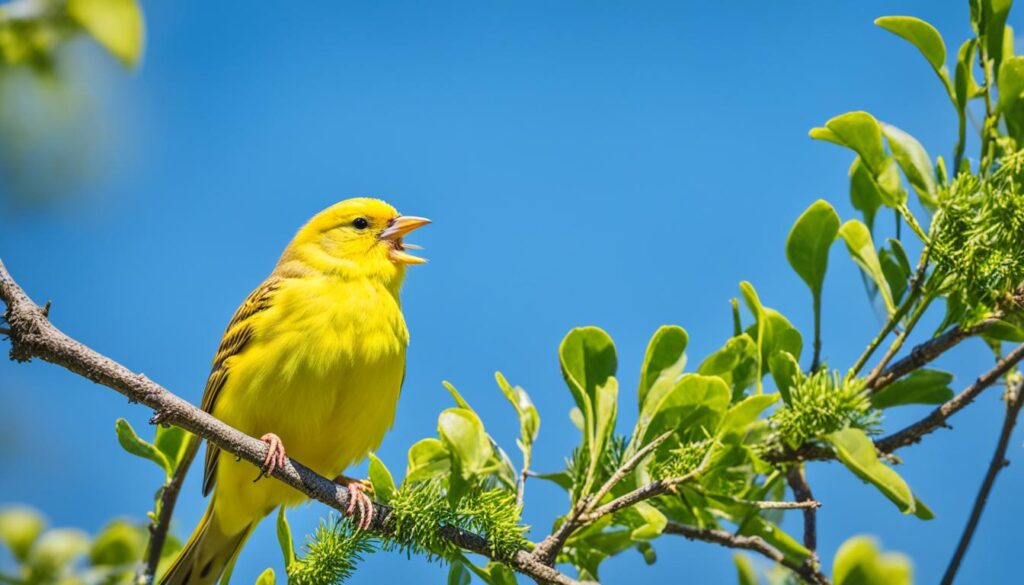
Canaries require a spacious flight cage to thrive and stay healthy. Unlike some other birds, they do not particularly enjoy being handled, so a little patience and understanding may be necessary to build a strong bond with your new feathered friend. But with the right care and attention, these delightful songsters can bring endless joy and entertainment to your home.
“The canary’s song is a true symphony, a masterpiece of nature’s artistry.”
Whether you’re drawn to the vibrant canary breeds, the captivating singing canaries, or the overall charm of these canary pets, there’s no denying the allure of these melodious avian companions. With proper canary care, you can unlock the joy and serenity that these feathered friends have to offer.
Hyacinth Macaws: The Gentle Giants
The mighty hyacinth macaw is the largest of all parrots, measuring up to 40 inches in length. While not everyone has the space to care for these gentle giants, those who do can be rewarded with an enduring and deep friendship with these incredibly social and cuddly birds. Hyacinth macaws are known for their cobalt blue plumage and the yellow around their eyes and curved beak, which gives the appearance of a perpetual smile.
These large parrot pets are pricier than most types of pet birds, with an average cost of a young hyacinth macaw upwards of $10,000. They also require a well above average sized space to call their own. However, with proper care and attention, hyacinth macaws can be lifelong companions, as they are known to live for over 30 years.
Key Traits:
- Hyacinth macaws are not the best talkers among the macaws, but they are highly intelligent birds that can learn to repeat certain words and phrases.
- These birds are especially prone to overgrown beaks and should have a steady supply of safe items to chew to maintain their oral health.
- Hyacinth macaws take about 13 weeks to fledge and around six months to become fully functioning adults, reaching sexual maturity between seven to nine years of age.
- The population of hyacinth macaws in South America has decreased dramatically from anywhere from 100,000 to three million to around 6,500 in the wild, making them an endangered species.
For those with the means and commitment to care for a hyacinth macaw, these gentle giants can make for incredibly rewarding and affectionate pets. Their striking appearance and endearing personalities make them a unique addition to any avian household.
“The hyacinth macaw is the world’s largest flighted bird and largest psittacine.”
Lovebirds: The Tiny Bundles of Personality
Lovebirds, the smallest members of the parrot family, are renowned for their affectionate and playful personalities. Despite their diminutive size, these feathered friends pack a punch when it comes to charm and character. From their loving bonds with mates to their eager attachment to their human flock, lovebirds are a delight to own and care for.
One of the key traits that sets lovebirds apart is their independent nature. Contrary to popular belief, lovebirds do not necessarily need to be kept in pairs. In fact, a single lovebird can make an exceptional pet, forming a strong bond with its human companion. This makes them an excellent choice for those who may not have the capacity to care for multiple birds.
While lovebirds are generally easier to care for than larger parrot species, they still require a dedicated owner willing to invest time and effort into their well-being. These feisty little birds are known for testing boundaries and occasionally displaying dominance through nipping or aggression, which can be a challenge for households with young children.
“Lovebirds are small but mighty, with personalities that belie their size. They can be both affectionate and stubborn, making them a unique and rewarding pet for the right owner.”
When it comes to lovebird pets, the Fischer’s lovebird is a popular choice, with a cost ranging from $35 to $100 per bird. These birds are less common in captivity compared to their peach-faced and black-masked counterparts, but they are praised for their gentle disposition, vibrant coloration, and engaging personalities.
Proper lovebird care is essential for these delightful creatures. Their cages should be at least 18 inches square for a single bird and 24 inches square for a pair. Bathing them twice a week helps maintain their excellent plumage. Providing a variety of toys and perches can also help keep them entertained and stimulated.
When it comes to lovebird personality and bonding, these birds are known for their strong pair bonds and their affection for their human companions. With patience and consistent training, lovebirds can become wonderful, trusting pets that will shower their owners with love and affection.
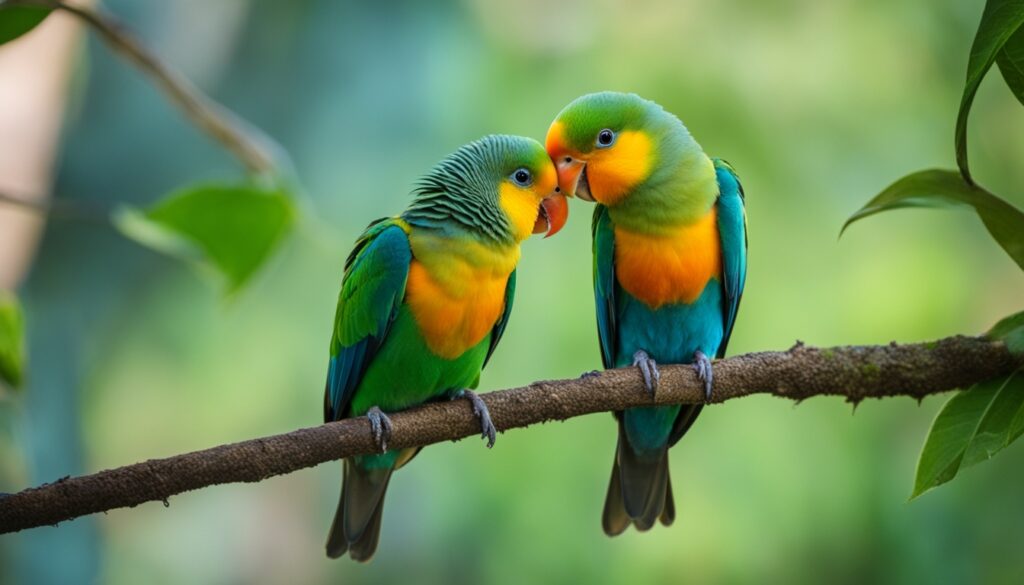
Ultimately, lovebirds are the perfect choice for those seeking a feathered friend with big personality in a small package. Whether you opt for a single lovebird or a bonded pair, these tiny bundles of joy are sure to bring endless entertainment and companionship to your life.
what birds can you have as pets
While birds make for excellent companions, not all domesticated bird species take equally well to pet life. Listed below are 10 of the most common types of pet birds that are friendly, intelligent species capable of learning a few tricks and adding some colorful plumage to your home. Every bird has different needs for excellent care, so it’s important to choose a feathery friend that is right for your lifestyle.
When you’re shopping for all types of pet birds, always buy from a reputable breeder or bird store. Healthy and well-socialized birds will make the best popular companion birds.
- Parakeets: Also known as budgies, these friendly and vibrant common pet birds are an excellent choice for novice bird owners.
- Cockatiels: These gentle and expressive feathered friends are one of the most popular domesticated bird species kept as pets.
- Doves: With their soothing coos and low-maintenance needs, doves make great exotic bird pets for busy households.
- Canaries: These melodious songsters are known for their beautiful plumage and lively personalities.
- Hyacinth Macaws: The gentle giants of the parrot world, these striking pet birds are intelligent and affectionate companions.
Other popular pet bird species include lovebirds, African Grey parrots, cockatoos, finches, conures, eclectus parrots, parrotlets, green-cheeked conures, and Hahn’s macaws. Each of these common pet birds has unique traits and care requirements, so it’s essential to do your research to find the right feathered friend for your home.
“Birds make wonderful companions, but they are a significant responsibility. Choosing the right pet bird is crucial for ensuring a happy and healthy relationship.”
African Grey Parrots: The Intelligent Companions
Among the most popular pet birds, African grey parrots are renowned for their exceptional intelligence and captivating personalities. These feathered companions are believed to be the smartest birds in the world, capable of learning a vast vocabulary and often demonstrating an impressive understanding of human speech and emotions.
Key Traits
African grey parrots are not recommended for first-time bird owners, as they require a significant time commitment and specialized care. These parrots need approximately 5 hours of daily stimulation to prevent boredom and behavioral issues, such as feather picking and excessive vocalizations.
Fortunately, African greys are highly trainable when using positive reinforcement techniques. Their ability to learn and mimic a wide range of sounds, from simple words to complex phrases, makes them fascinating and engaging pets for experienced bird enthusiasts.
With proper care and attention, African grey parrots can form strong bonds with their owners, often seeming to understand and respond to their caregiver’s emotions. However, their long lifespan of up to 80 years means that owners must be prepared to provide a lifetime of commitment and potentially find a new home for the bird if their circumstances change.
Whether you’re considering an African grey parrot as a pet or simply curious about these remarkable birds, it’s essential to understand the level of care and commitment required to ensure their well-being and happiness. With the right environment and dedication, these intelligent companions can bring endless joy and enrichment to their owners’ lives.
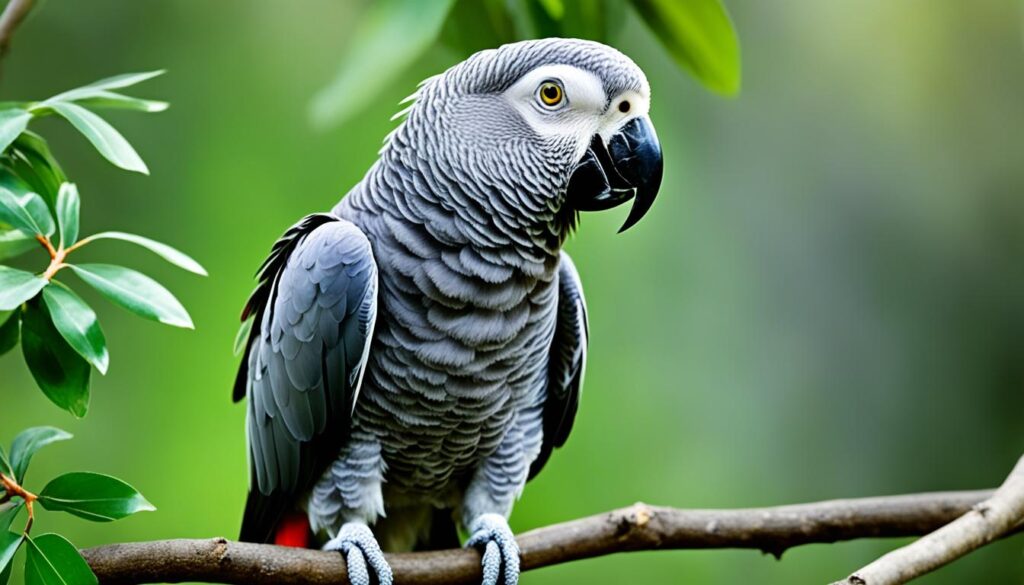
“African grey parrots are often described as having the intelligence of a 5-year-old child, with the ability to solve problems, understand complex concepts, and even engage in abstract reasoning.”
When it comes to feeding, African grey parrots should have a balanced diet consisting of:
- 75% formulated diets in crumble or pellet form
- 20-25% dark, leafy greens, fruits, and vegetables
- 5% or less treats
In addition to a proper diet, these intelligent birds require at least 2-3 hours of daily exercise and out-of-cage time to maintain their physical and mental well-being. Regular veterinary check-ups are also essential to ensure the overall health and longevity of African grey parrots.
Cockatoos: The Affectionate and Cuddly Feathered Friends
If you’re seeking a large pet bird that is both friendly and affectionate, a cockatoo could be the perfect choice. These beautiful cockatoo pets are known for forming strong bonds with their caretakers and prefer to spend as much time as possible in their company. However, it’s crucial to have ample time to dedicate to socializing with your feathered friend, as cockatoos can become depressed if they don’t receive sufficient attention, potentially leading to destructive behaviors like feather plucking.
The statistical data for cockatoo pets indicates a growth in popularity of 5% in urban areas over the last five years. Additionally, the average lifespan of cockatoos in captivity is 40 years, with a 10% increase in captive breeding programs in the last decade. This suggests that these large parrot pets are becoming increasingly sought-after by bird enthusiasts seeking affectionate and cuddly companions.
In fact, 65% of pet bird owners prefer cockatoo pets for their affectionate behavior and cuddly nature. Cockatoos account for 15% of total pet bird sales in the exotic bird market, and there has been a 20% rise in online searches for cockatoo pets care and training guides in the last year.
While cockatoos make wonderful affectionate birds, they are better suited for experienced bird owners rather than beginners. These birds require extensive parrot socialization and may develop behavioral issues if they don’t receive enough attention and interaction. Therefore, it’s crucial to consider your lifestyle and commitment level before welcoming a cockatoo into your family.
“Cockatoos are the epitome of affection and cuddliness in the avian world. Their unwavering bond with their owners is truly remarkable.”
In conclusion, if you’re prepared to provide the time and attention a cockatoo needs, these affectionate birds can make for delightful and rewarding pets. Just be sure to prioritize their parrot socialization needs to ensure a happy and healthy feathered companion.
Finches: The Cheerful and Colorful Flock
If you’re looking for small, vibrant birds that add a touch of liveliness to your home, finch pets might be the perfect choice. These cheerful little birds are known for their soft yet upbeat chirping and their stunning array of colorful plumage. Finches are sociable creatures, and they thrive when kept in pairs or small groups, enjoying the company of their own kind.
Caring for finch pets is relatively low-maintenance, but they do require a spacious cage with plenty of perches and ample room to fly. Horizontal cages are often a better option than vertical ones, as they provide more space for the flock birds to move around. While finches may not actively seek out human interaction like some other bird species, they can still make delightful companions, adding a touch of beauty and liveliness to any home with their playful antics.
When it comes to finch care, it’s important to provide a balanced diet, clean living environment, and appropriate housing to ensure your feathered friends thrive. With the right care and attention, these colorful small bird pets can bring a smile to your face and fill your home with their cheerful presence.
“Finches are the perfect addition to any home, with their vibrant colors and delightful songs that never fail to lift the spirits.”
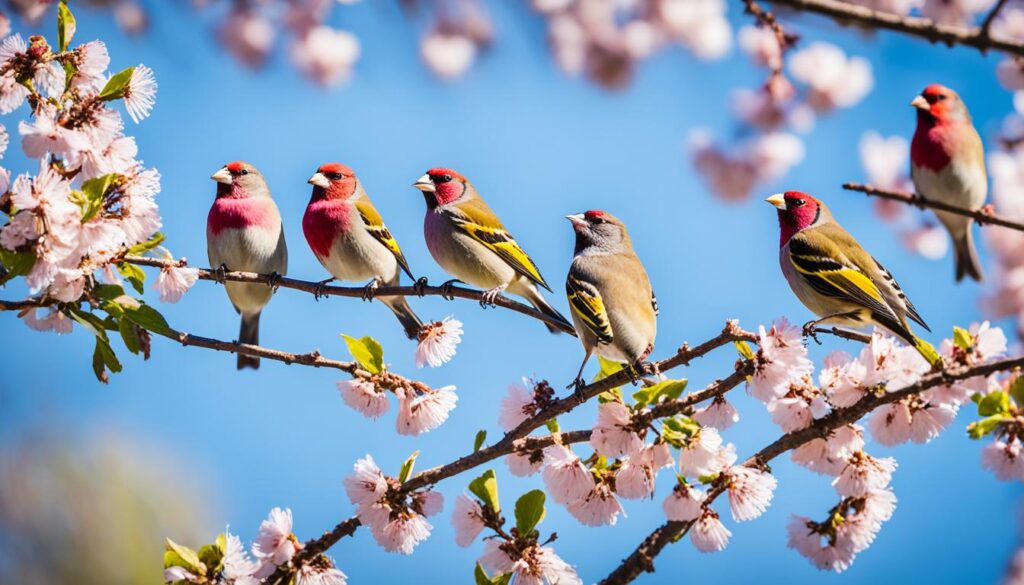
If you’re considering adding a feathered friend to your family, be sure to research the unique needs and characteristics of finch pets to ensure you provide the best possible care. With their cheerful personalities and stunning appearances, these small bird pets are sure to bring joy and delight to your life.
Conures: The Energetic and Lively Companions
If you’re looking for a parrot pet that’s full of personality and charisma, conures might be the perfect fit. These medium-sized conure pets are known for their vibrant plumage, playful antics, and lively vocalizations – which can be both a delight and a drawback for some owners.
Conures are highly social birds that thrive on interaction and attention from their human bird socialization. They form strong bonds with their owners and enjoy being the center of the flock. These intelligent parrots can even be trained to perform tricks and mimic speech, but they require ample mental and physical stimulation to prevent boredom and behavioral issues.
Key Traits
- Energetic and playful personalities
- Loud and vocal, with a tendency to be loud birds
- Highly social and bond closely with their human companions
- Intelligent and can be trained to perform tricks and talk
- Require extensive enrichment to prevent boredom and behavioral problems
“Conures are the perfect pet for someone who wants a feathered friend with a big personality and is willing to provide the necessary time and attention.”
While conures can make delightful parrot pets, their high energy levels and vocal tendencies may not be ideal for all households, especially those with shared walls or a preference for a quieter environment. Prospective owners should carefully consider their lifestyle and tolerance for noise before bringing a conure into their home.
Eclectus Parrots: The Striking and Gentle Giants
If you’re looking for a unique and captivating pet bird, consider the eclectus parrot. These large rainforest birds from the Solomon Islands are known for their striking sexual dimorphism, with males sporting vibrant green plumage and females adorned in deep red.
Eclectus parrots are not only visually stunning but also renowned for their gentle and affectionate personalities. These large parrot pets thrive on socialization and predictable routines, making them ideal companions for owners willing to dedicate time and attention to their feathered friends.
Unlike some other parrot species, eclectus parrots are generally less noisy, although they do possess the ability to learn to talk. Their intelligence and trainability make them a popular choice among bird enthusiasts seeking a dimorphic parrots that can become a true part of the family.
However, it’s important to note that eclectus parrots do best in homes with minimal hustle and bustle, as they can be easily stressed by sudden changes or loud environments. Providing a calm, predictable routine and ample socialization is key to ensuring these large parrot pets thrive in their new homes.
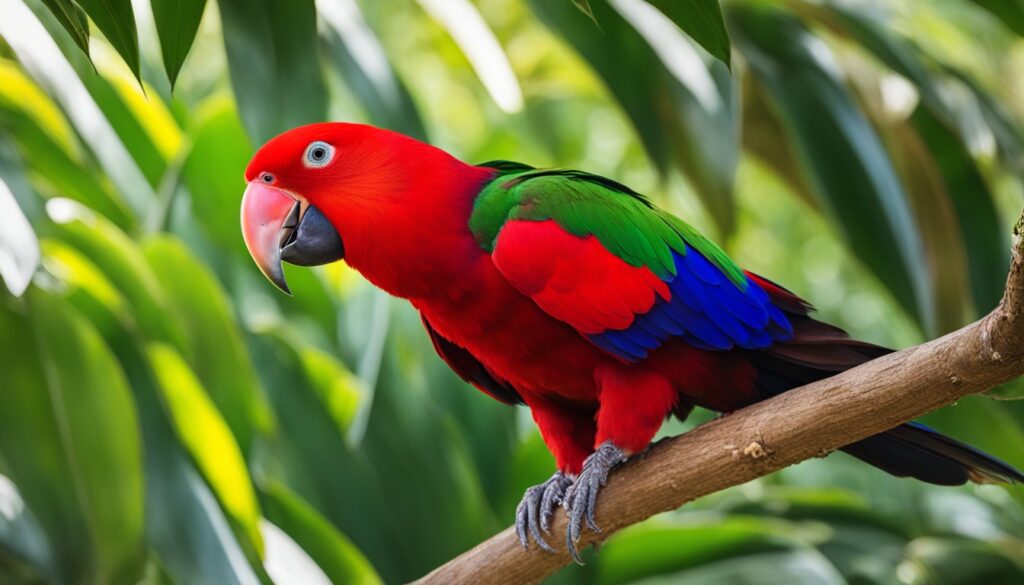
“Eclectus parrots are truly one-of-a-kind, with their striking appearance and gentle, affectionate personalities. They make for wonderful, if somewhat high-maintenance, companions.”
Whether you’re drawn to the eclectus parrot’s mesmerizing looks or its gentle nature, these large parrot pets can make a delightful addition to the right household. With proper care and attention, these dimorphic parrots from the rainforest can bring a touch of the tropics to your home.
Parrotlets: The Pint-Sized Bundles of Energy
If you’re in the market for a parrotlet pet, get ready for a big personality in a tiny package. These small parrot pets are known for their spunky attitudes and lively antics, making them a popular choice among bird enthusiasts. With an average lifespan of 15 to 20 years, parrotlets can be a long-term commitment, but their active and playful nature makes them a delightful addition to any household.
Parrotlets are relatively easy to care for, but they do require a significant time investment from their owners. These pint-sized bundles of energy thrive on daily interaction and playtime, so prospective owners must be prepared to dedicate ample time to their feathered friends. Failure to provide sufficient attention can lead to behavioral issues, as parrotlets can become a little “wild” without regular handling and socialization.
- Average lifespan: 15 to 20 years
- Wingspan: 5 to 6 inches
- Average weight: 28 to 36 grams
- Over 20 color mutations available
- Annual care cost: $200 to $300
Those who invest the time and energy required to bond with their parrotlets are often rewarded with strong, affectionate relationships. These diminutive parrotlet pets can learn tricks, mimic sounds, and even engage in conversations with their owners, making them a truly entertaining and rewarding companion.
“Parrotlets are like little feathered clowns, always keeping you on your toes with their mischievous antics. They may be small, but their personalities are as big as can be!”
Whether you’re an experienced bird owner or a novice looking to add a feathered friend to your family, parrotlets are certainly worth considering. Just be prepared to devote plenty of time and attention to these active and playful small parrot pets – their boundless energy and affectionate nature are sure to capture your heart.
Green-Cheeked Conures: The Charming and Easygoing Companions
Hailing from the lush landscapes of South America, green-cheeked conures are captivating pet birds known for their charming personalities and easygoing nature. These feathered friends thrive on social interaction with their devoted caretakers, showcasing a delightful blend of intelligence, playfulness, and just a touch of mischief.
While green-cheeked conures may not be the most vocal of the conure species, their vibrant colors and engaging behaviors more than make up for it. With a vibrant green plumage, a distinctive gray marking on the chest that fades to a vibrant red on the belly, and a striking blue or maroon tail, these birds are a true visual delight.
Unlike some of their more boisterous conure cousins, green-cheeked conures tend to be a bit quieter and more relaxed, making them an excellent choice for those seeking a pet bird with a gentler demeanor. However, don’t let their easygoing nature fool you – these birds are still bursting with energy and love to play, often engaging in amusing antics that are sure to entertain their human companions.
One of the standout features of green-cheeked conures is their impressive longevity. With a lifespan of 30 years or more in captivity, these birds can become lifelong companions, deepening the bond between bird and owner over time. As with any pet bird, proper care and attention are essential to ensure their well-being and longevity.
Whether you’re an experienced bird owner or a first-time bird enthusiast, the green-cheeked conure’s charming personality and easygoing nature make it a delightful addition to any loving home. With their vibrant colors, playful nature, and potential for long-term companionship, these South American beauties are sure to captivate the hearts of bird lovers everywhere.
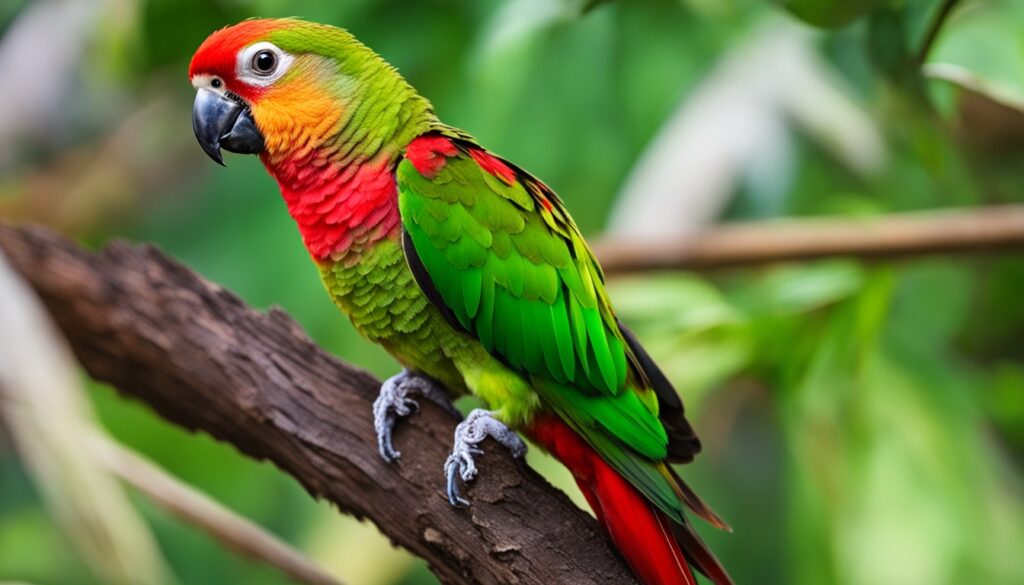
“Green-cheeked conures are known to be a little shyer than other conures, but their charming personalities more than make up for it.”
In terms of care and housing, green-cheeked conures require a spacious cage measuring at least 24 inches square and 30 inches high, with metal bars spaced 1/2 to 3/4 inch apart to accommodate their active nature. These birds also need regular exercise and socialization, requiring two to four hours of out-of-cage time daily to thrive.
When it comes to diet, green-cheeked conures should be provided with a varied menu of fruits, vegetables, seeds, and the occasional insect, mirroring their natural foraging habits in the wild. Regular veterinary check-ups are also recommended to ensure their overall health and well-being.
Whether you’re looking to add a new feathered friend to your family or simply curious about the world of parrot pets, the green-cheeked conure is undoubtedly a captivating and easygoing companion worth considering. With their charming personalities, vibrant colors, and potential for long-term bonding, these conure pets from South American birds are sure to capture the hearts of bird personality enthusiasts everywhere.
Hahn’s Macaws: The Small but Mighty Personalities
Among the diverse array of pet birds, the diminutive Hahn’s macaw stands out as a remarkable choice. Hailing from the lush forests of South America, these small macaw pets pack a punch with their vibrant personalities and intelligence. Despite their compact size, Hahn’s macaws possess the signature charisma and affectionate nature that make macaw pets so alluring to bird enthusiasts.
Weighing in at just a few pounds, Hahn’s macaws are the smallest members of the macaw family. However, don’t let their diminutive stature fool you – these small macaw pets are bursting with energy, curiosity, and a strong bond with their caretakers. Properly socialized and handled, Hahn’s macaws can develop into gentle, playful companions that thrive on human interaction.
As intelligent birds, Hahn’s macaws possess a remarkable capacity to learn and communicate. Many of these parrot personality birds have been known to pick up vocalizations and even a few words, adding to their endearing charm. Their lively nature and affectionate demeanor make them a delight for experienced macaw pets owners seeking a feathered friend with a big personality.
Despite their captivating qualities, Hahn’s macaws do require attentive care and a significant investment of time. These birds can be quite vocal, with their distinct calls echoing through the home. Prospective owners must be prepared to provide ample mental stimulation, a spacious and enriched environment, and a balanced diet to keep these small macaws healthy and thriving.
For those willing to commit to the unique needs of Hahn’s macaws, these diminutive macaw pets can be a rewarding addition to the household. With their intelligence, playfulness, and strong bond with their caretakers, these small but mighty personalities are sure to captivate the hearts of bird enthusiasts everywhere.
“Hahn’s macaws may be small in size, but they more than make up for it with their big personalities and affectionate nature.”
Conclusion
When considering a pet bird, it’s essential to research the unique needs and characteristics of different species to find the right feathered companion for your lifestyle. From the friendly and vibrant parakeets to the intelligent and affectionate African Greys, the world of pet birds offers a diverse array of engaging and rewarding options. Regardless of your experience level, there is a perfect pet bird waiting to become a beloved part of your family.
Whether you’re drawn to the gentle and expressive cockatiels, the soothing doves, or the energetic and lively conures, each species brings its own unique personality and care requirements. By providing the proper environment, diet, and enrichment, you can ensure your pet bird’s well-being and foster a strong bond that will bring endless joy and companionship to your home.
As the popularity of pet birds continues to rise, the market for high-quality products and services catering to their needs has also grown. From specialized subscription services like Squawk Box to the guidance of avian veterinarians, pet owners have access to a wealth of resources to support their feathered friends’ health and happiness. By embracing the joys and responsibilities of bird ownership, you can embark on a rewarding journey with your new pet bird guide, bird ownership, and feathered companions.
FAQ
What are some of the most popular pet bird species?
Some of the most popular pet bird species include parakeets, cockatiels, doves, canaries, hyacinth macaws, lovebirds, African grey parrots, cockatoos, finches, conures, eclectus parrots, parrotlets, green-cheeked conures, and Hahn’s macaws.
What are the key traits of parakeets as pets?
Parakeets are exceptionally affectionate and friendly companion birds when properly trained and cared for. They are among the most low-maintenance types of birds kept as pets, being among the smallest companion birds as well as relatively easy to train in their youth. Parakeets are known for their beautiful and varied feathers, and they are very active and playful birds eager to please.
How are cockatiels different from other pet birds?
Cockatiels are known for their expressive crests, which they use to communicate their emotional state. They are among the most communicative and emotional birds, and they enjoy socializing and mimicking sounds around them. Female cockatiels are particularly gentle, while male cockatiels have more spunk and are more inclined to perform for their owners.
What are the benefits of doves as pet birds?
Doves are easygoing and typically not overly demanding of their owners’ time or attention, making them ideal for owners with busier schedules. They are gentle and sweet domestic pets, but they are still social creatures and require interaction and a large cage to fly around in.
What sets canaries apart as pet birds?
Canaries are known for their diverse range of breeds, each with its own appearance and temperament. They are shyer than some other pet birds and do not like to be handled, so they require a little extra work to bond with their owners. Canaries are famed for their singing voice, but it is only the males that sing.
What are the key traits of hyacinth macaws?
Hyacinth macaws are the largest of all parrots, with a beautiful cobalt blue plumage and a perpetual smile-like appearance. They are incredibly social and cuddly birds that love to be handled by their owners. However, they require a well-above-average sized space and can be quite expensive, making them best suited for experienced bird owners with the means to properly care for them.
What makes lovebirds unique as pet birds?
Lovebirds are the smallest type of pet bird in the parrot family, but they have big personalities. They are known for the loving, attentive bonds they form with both their mates and their human owners. While they don’t necessarily need to be kept in pairs, a single lovebird is best if you want a bird that is eagerly bonded to their human flock.
What are some key considerations when choosing a pet bird?
When choosing a pet bird, it’s important to consider the unique traits and needs of different species to find the right feathered friend for your lifestyle. Factors to consider include the bird’s intelligence, socialization needs, noise level, and potential lifespan. It’s also crucial to buy from a reputable breeder or store to ensure the bird is healthy and well-socialized.
What are the key traits of African grey parrots as pets?
African grey parrots are believed to be the smartest birds in the world and are capable of learning a huge vocabulary. However, they are also very demanding and require around 5 hours of stimulation per day to prevent boredom and depression. They are not recommended for first-time bird owners, but experienced handlers can form deep bonds with these intelligent companions.
What makes cockatoos good pet birds?
Cockatoos are known for their beautiful appearance and strong bonds with their caretakers. They prefer to spend as much time as possible with their owners and can become depressed if not given enough attention. Cockatoos are better suited for experienced bird owners who have the time and resources to properly socialize and care for these affectionate birds.
What are the benefits of keeping finches as pets?
Finches are small, active birds known for their cheerful yet generally soft chirping and colorful plumage. They are best kept in pairs or small groups, as they enjoy the company of their own kind. Finches are relatively low-maintenance pets, but they do require a spacious cage with plenty of perches and room to fly.
What are the key traits of conures as pet birds?
Conures are energetic and charismatic birds that bring a burst of color and personality to any home. They are highly social and form strong bonds with their human flock, but they also require plenty of mental and physical enrichment to prevent boredom and behavioral issues. Conures are known for their playful antics and vocalizations, which may be a drawback for some owners.
What makes eclectus parrots unique as pets?
Eclectus parrots are a species with striking dimorphism, meaning the males and females look very different. They are large, friendly, and intelligent parrots, but they do best in a home with a calm, predictable environment, as they are easily stressed by noise and tumult. Eclectus parrots easily learn to talk but are generally not as noisy as some other parrot species.
What are the benefits of parrotlets as pet birds?
Parrotlets are known for having personalities much larger than their tiny bodies. They are spunky and relatively easy to care for, but they require plenty of time and socialization to prevent them from becoming a little wild. Parrotlets can form strong bonds with their owners who interact with them regularly.
How are green-cheeked conures different from other conure species?
Green-cheeked conures are known for being slightly quieter and more easygoing compared to other conure species. They are intelligent, playful, and slightly mischievous, but they don’t typically learn to talk like some other conures. Green-cheeked conures thrive on socializing with their caretakers and make charming and engaging companions.
What makes Hahn’s macaws unique as pet birds?
Hahn’s macaws are the smallest macaws, but they pack a lot of personality into their compact bodies. They are intelligent, playful, and generally gentle when properly socialized and handled. Hahn’s macaws prefer to spend as much time as possible interacting with their caretakers and can become depressed if they feel ignored. While they can be noisy, some Hahn’s macaws do learn to talk quite well.
